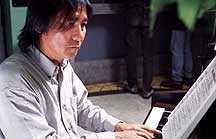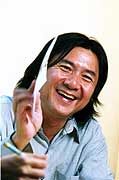|
From : Bangkok Post
- RealTime
- Friday 20 April, 2001
COVER STORY
Kong Rithdee
Melody
maker
MUSIC: Dnu Huntrakul has a rare
knack for marrying Western instruments and Thai tunes, as his
latest release `Pleng Bangkok' attests
Dnu
Huntrakul's music is a stimulus to the senses, a euphonic stream
that meanders from the eardrums down to the mind's eyes. It inspires
ideas and conjures up images -- often of the past. And although
its melodic beauty is portrayed by the orchestral grandeur of
Western instruments, its foundation is strangely Thai.
 |
"If
I think China Dolls doesn't suit my age, what's there for
me to listen to?" Candy-sweet songs for kids are OK, but Dnu
Huntrakul says the local music industry needs to produce something
fresh to meet the tastes of a changing society. -- ANUSORN
SAKSEREE Pleng Bangkok relives the retro charm of the 1950s.
|
Call it adult music, Dnu jokes, "because
kids wouldn't have the composure to hear my songs."But at least
they should try. The composer has just released his new album
called Pleng Bangkok ("Bangkok Tunes"),
in which he continues to exhibit his well-known faculty for concocting
the best from bipolar worlds. Again, his musical cocktail is made
up of Thai melodies of old, but on this outing they have been
rendered with the fizzling, colourful sonata of the piano and
violin. At Sanan Bakery on Sukhumvit Soi 31, Dnu sat down recently
with the press to talk about his work, his thoughts, his concept
of music in Thai society, and how it's so easy -- even for kids,
if they tried -- to soak up the nostalgic lucidity of his tunes.
With a shoulder-length
bob, the 50-year-old Dnu bears the look of the hermetic artist.
The composer is known for the solemnity of his grand symphonic
scores, such as the famed The Light of Asia, which thundered at
the finale of the 1998's Bangkok Asian Games, and other ceremonial
pieces for royal functions and for cultural events.
But watch
out for that crescendo of laughter as Dnu also has a lighter side.
The man might appear like your odd uncle, but there is still a
whiff about him of the excitement and fun of his teenage years
spent in the frenzied 1960s. This is reflected in the witty notes
of his music, of which there are plenty on the self-produced,
self-funded and self-promoted Pleng Bangkok.
"The idea
is to relive the atmosphere of Bangkok 50 years ago, when the
culture of music was blossoming and when people were living really
happy lives," Dnu says of his release.
"That time was a golden age when
Thais began to adapt the Western notion of entertainment, but
we still kept our roots intact. It was a fusion of styles. Back
then we enjoyed ballroom dancing, but the band could also switch
mode to play traditional ram wong -- and kept the audience on
their feet."Play the disc and revel in the sound experience. Pleng
Bangkok is very close to being a time machine. It takes listeners
back to when their fathers strutted their stuff to the jumpy tango
tunes in the dance halls of Suan Lumpini or Suan Amporn, and when
Ratchadamnoen was a swanky avenue of urban modernity. Dnu picked
some numbers to represent the "cool" of that generation. His rearrangements
are more polished than the originals, yet they maintain the old
tunes' characteristic wit. Finally, being played on a piano and
violin has lent them a dainty, classical flavour.
For example,
Deun Eei was a tango number that was a smash hit 40 years ago.
Meanwhile Khaek Chuen Jao was a song spiced up with an Indian
melody and used as the theme tune for the now-defunct TV Channel
4. Then there's an exhilarating medley of ram wong songs (the
sober equivalent of today's dance remix!). Dnu has also included
two vocal numbers; a funky fox-trot Huan Kam Nueng and the majestically
lyrical Ratree Both songs were originally written by Eua Suntornsanan
and sung by Mantana Morakul, the respective king and queen of
the stylus in their day.
Performed here by vocalist Supatra
Korat -- with violinist Nora-art Janklam and pianist Jun Matsuko
-- these time-honoured tunes now give off a fresh sound and a
sassy rhythm. Who is it that said these are adult songs?Looking
back, Dnu believes there are cultural angles worth taking note
of from the 1950s. The music of that time, he remarks, evolved
purely to serve the social attitude of the people -- which is
the right chemistry in artistic progression. It was a fun, happening
decade. Thais were still selective in welcoming foreign influences,
because at that pivotal point the nation was still attached to
the cultural legacy of its ancient past.
 |
| The
veteran composer shows his lighter side. |
"Think of Suntaraporn," Dnu says,
referring to a legendary Thai-style big band of the 1940s. "They
adopted Western forms -- the instruments and the Latin beats --
but created their own brand of Thai songs. It was cool to make
a tune sound farang but at heart they were aware of their Thai
origin. No one was worried about preserving Thai ways, because
people were so secure in their knowledge of who they were, and
they embraced alien ideas only when they thought it'd be useful
to society.
"But soon
this system went out of order, and we found ourselves in chaos,"
Dnu continues. "We lost our confidence and we couldn't reach into
our history to see what we were capable of doing. It's easier
now to believe that everything good comes from abroad. Music,
too."In an ironic twist, Dnu half-jokes that he perpetually belongs
to the forgotten generation. When he was a young boy, Thai music
catered solely for grown-ups. But as he grew up and the local
song industry found its footing, a new market force prevailed.
And nowadays music labels only fashion lollipop songs for adolescents.
Dnu believes his generation has avoided targetting by the music
industry and has become a neglected segment of the record-buying
public.
"If I think
China Dolls doesn't suit my age, what's there for me to listen
to?" Dnu says, revealing the musician is more in touch with the
teen music scene than you might think. "OK, I can resort to luk
thoong [Thai folk songs] or to numbers by Suntaraporn. But what
about something fresh? What about something that might indicate
that our musical vision has grown? As it stands the reaping short-term
benefits and refuses to move forward."It's easy to slip into the
tired, old debate on the ruthless commercialisation of musical
creativity, and on how we've all unconsiously become consumers
rather than music lovers. But Dnu doesn't brandish a crusading
flag to save his art. He's an observer who's content to do his
best by making a little difference here and there.
Dnu has written hundreds of musical
scores for advertisments and ceremonies, and made a stack of records
since he began his career in the 1970s. Given his artistic calibre,
it's interesting that Dnu has chosen not to stay aloof in his
Ivory Tower. The songsmith -- who grew up in a house resounding
with Elvis and the Rolling Stones as well as Mozart and Chopin
-- says it's important for a musician to be perceptive to the
direction of their society while remaining dynamic in bringing
about new ideas. It's useless, Dnu insists, to create something
the audience can't comprehend.
In 1982, before the East-meets-West
bandwagon became an overused tagline, Dnu helped form the light
orchestra Mai Thai, a pioneering attempt to revitalise old Thai
tunes by giving them a classical touch. Later on he surprised
many by releasing a few albums on the Grammy label. One of his
songs in this foray, a juicily hip luk thoong tune called Ai Noom
Pom Yao became an unexpected disco hit among urban clubbers. There's
a fine line separating traditionalists from progressive artists
who endeavour to make something new out of something old. Which
side is he on?"It's difficult to say," Dnu replies with a dry
smile. "Most of my works are based on old inspirations. But please
understand, I don't appreciate them because they're old but because
they're good and because they can be the springboard to create
something new. You can't call one billion Chinese traditionalists
simply because they still use chopsticks, can you?"In the same
manner, I use modern techniques in my music not because I want
to look smart, but because they're interesting and because they
have the potential to fit into the new culture. This, I believe,
doesn't qualify me as an avant-garde artist either."This cautious
stance shouldn't be interpreted as being an ambiguous one. Dnu
knows which side of the fence he sits. As traditionalists grow
increasingly paranoid over the presence of foreign culture, Dnu
says it makes little sense to resist the global tide of change
simply to perpetuate the stubborn pride of being Thai. "The tidal
wave is coming and we know we can't push it back," he adds. "Instead
of fighting in vain, we should realise that in the water there
might be minerals for us to benefit from. That's the way forward."Steadily,
Dnu tries to push his way forward. He's a talent at the margin
of the mainstream industry, but his music is heard -- and he never
stops working. Yet the man laments he's still lingering at the
foothill of self-actualisation; he says he has achieved less than
10% of what he is capable of. But don't expect Dnu to step on
the gas anytime soon. The man has chosen to be in the position
he is in. He prefers to plod carefully, to patiently brew the
creative atmosphere and wait for that right chemistry between
his art and his audience.
"I could sit down to write a major
symphony today," he says. "But what's the point of doing that
when society isn't ready to accept it? I'd be left alone if I
did that, and I guess I would have to drive a taxi for a living
instead!"It's better to walk hand in hand with society and to
create contemporary art that serves the cultural context of today,
not of 20 years from now, because I might not be around to hear
what people think about my work. Music is a language, a two-way
communication. I can't make good music all by myself."But he doth
protest too much. There is an enormous amount of "good music"
on Pleng Bangkok -- enough to assure Dnu of a lasting legacy.
For the moment, the composer has set himself the task of bringing
forth folk instruments -- like the kaen pipe -- and pitch them
against the lush background of an orchestral ensemble.
Which sounds
like another stab at adult music. "It's not fashionable, but it's
not that hard," Dnu says. "It doesn't take much to enjoy a piece
of beautiful music. Not much at all."
From : Bangkok Post
- RealTime
- Friday 20 April, 2001
|